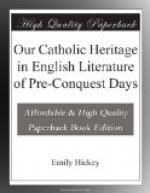I have reminded you of England’s great debt to Ireland through St Aidan and others. I must tell you of a record of St Bede’s, which shows how gladly Ireland in old days, as ever, shared the priceless gift which she of all countries, received with the most passionate entireness and held with the most unswerving steadfastness. It was in the year 664 that there was a great pestilence, raging both in England and Ireland. At the time there were many Englishmen in Ireland who had gone there, “either for the sake of divine studies, or of a more continent life”; some of them, he says, became monks, and others devoted themselves to study, “going about from one master’s cell to another.” “The Scots (that is the Irish) willingly received them all, and took care to supply them with food, as also to furnish them with books to read, and their teaching, gratis.”
Where should we be but for the work done in the monasteries? How can we be grateful enough for what went on there in the way of thought, research and the collecting of materials, in addition to the work of teaching: all fed by the life of prayer and praise and self-denial? Let us try to think about the quiet, patient work of scholars and students; about their noting of so many facts and detailing of them. Let us think of the beginnings of English history and literature; of the writing of precious manuscripts; the careful copying of them; each of them taking so much time to complete and being so costly in production, especially when there was added to care and skill the artistic beauty of decoration and illumination.
From these quiet abodes of the piety that transfused itself through loving toil and discipline, light streamed forth to go on shining and shining, on through the long centuries to come.
We must now have a look into the pages of the great English Chronicle which we should not possess had it not been for these good monks, and we will take the account of the martyrdom of Archbishop AElfeah, whom you know best under the Latinized form of his name, Alphege. His heavenly birthday was the 19th of April. The king who is spoken of was AEthelred who was called the Unready, which word means without counsel, and then of ill-counsel. You know how we talk of “ill-advised” conduct or speech. There is a fourteenth century poem which speaks of Richard the Second as “redeless.” And, because there is no such thing as being neutral; because, if we are not good, we are bad, the word got the meaning of foolish or worse. Freeman, the great historian says that AEthelred “was perhaps the only thoroughly bad king among all the Kings of the English of the West Saxon line; he seems to have been weak, cowardly, cruel, and bad altogether.”




